GROWING A FUTURE
Women farmworkers create food oases in the Northern Cape sands
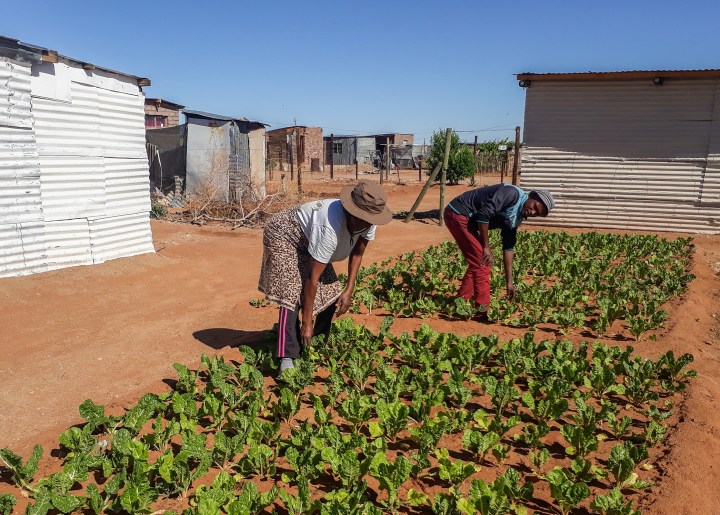
Among the rocks, sand and astonishing heat of the Northern Cape, spinach, tomatoes, carrots and peppers sprout up in gardens. Nearly 300 women farmworkers created these household gardens to feed their families and neighbours year-round, in a province where most farmworkers face severe food insecurity.
Nonceba du Plessis had moved the last rock which she could lift by hand. The rest would have to be taken out by a digger to expand her vegetable garden. It’s over 40 degrees there in the north of the Northern Cape, but this doesn’t deter her. She’s experienced worse conditions in the vineyards of others.
That night, she put vegetables she had grown herself on the table for her household of 12. She is her own boss, and no one needs to go to bed hungry. This would have been unthinkable seven years ago.
She recounted these days spent in her home vegetable garden at a talk she presented at the Future of Farm Workers Conference in Cape Town 16-18 October 2019.
She is a member of the Women on Farms Project which helped her and nearly 300 other women farmworkers in the Northern Cape to start their own vegetable gardens in order to cope with the food insecurity (in other words, not having sustained access to safe, nutritious food of their choice for good health) that comes with their increasingly seasonal, casual, low-paying work on farms.
Their message at the Future of Farm Workers conference to their peers was clear: keep learning about and asserting your rights as a (woman) farmworker but plant a garden to survive right now. Their message to government: take us seriously.
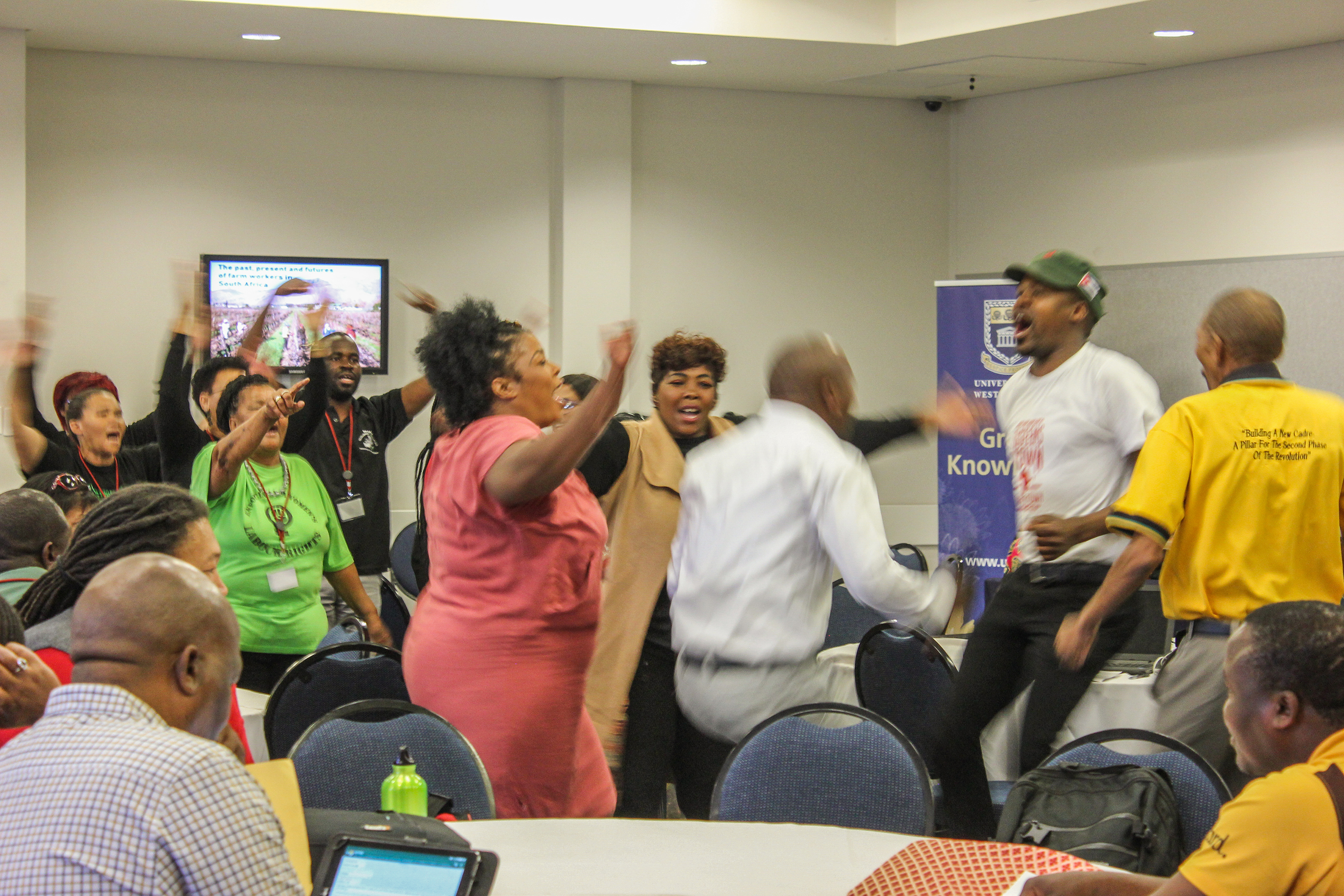
Nonceba du Plessis (centre, in tan coat) joins other farmworkers as they open The Future of Farm Workers conference with dance and song. Photo: Christi Nortier
She and her fellow presenters, Lenie Coetzee and Sanna Paulse, travelled to contribute their insight to imagining and planning for a better future for South Africa’s most food insecure group. But, what to do about hunger and income today? Start your own garden – whether it’s in your backyard or in a bucket filled with soil and seeds.
Du Plessis and Paulse have been growing their own vegetables for more than seven years in their farming communities between Kakamas and Upington.
Du Plessis cares for her five children, plus the children of her brother. Altogether, there are 12 people in her household who depend on her. Paulse looks after the seven orphaned children of her siblings.
Like most other farmworkers in the Northern Cape, they have both been seasonally employed on grape farms and in raisin production.
Paulse has been working on farms since she was a teenager. “The money I got from the farm work didn’t cover the costs of food for myself and my children for even one week.
“There were many nights when I had to sleep hungry. There were many days when the children had to go to school without food. It was very difficult for me. Some weeks I would work two days here, three days there because the farmers didn’t want to pay,” she recounts.
Her and Du Plessis’ experience of farm work is not dissimilar to those of other women farmworkers in their province and the rest of the country.
Northern Cape women farmworkers are “…one of the poorest groups living in rural areas of the most food-insecure province of South Africa…”, said Lauren Tavener-Smith who presented research to the conference on the link between seasonal employment and seasonal food insecurity amongst women farmworkers in the Northern Cape.
The Women on Farms Project, together with the University of the Western Cape, gathered information from more than 140 women who work in the table grape, wine grape and raisin industry in the Northern Cape.
Nearly half said they are seasonal workers, that they are not paid the sectoral minimum wage of R18 an hour and did not receive a copy of their contract.
More than 70% reported they did not have access to bathrooms and wash facilities in the vineyards and were not given protective clothing.
The majority were not paid when they went to the clinic and were exposed to pesticides one hour after they were sprayed.
It was reported by 84% that the farmer did not allow unions on the farm and 69% reported that no labour inspector had visited the farm to their knowledge.
According to the report, these labour rights violations are more widespread in the Northern Cape than in the Western Cape.
This has repercussions for the home, too. More than 80% of farmworkers in the Northern Cape face severe food insecurity during the winter months from April to August.
This is the time of fewer employment opportunities on the farms and the only income may be social grants. The grants are often not enough to cover food costs. Hunger creeps back in January when school fees and Christmas bills are due.
This was echoed by the co-ordinator of the Women on Farms Project for the Northern Cape, Lenie Coetzee. “What we see with most seasonal farmworkers is that there is a period of income and after that there is no income, but they have to live and make a plan for food on the table. That’s why we brought in food security and why we started the food gardens.’
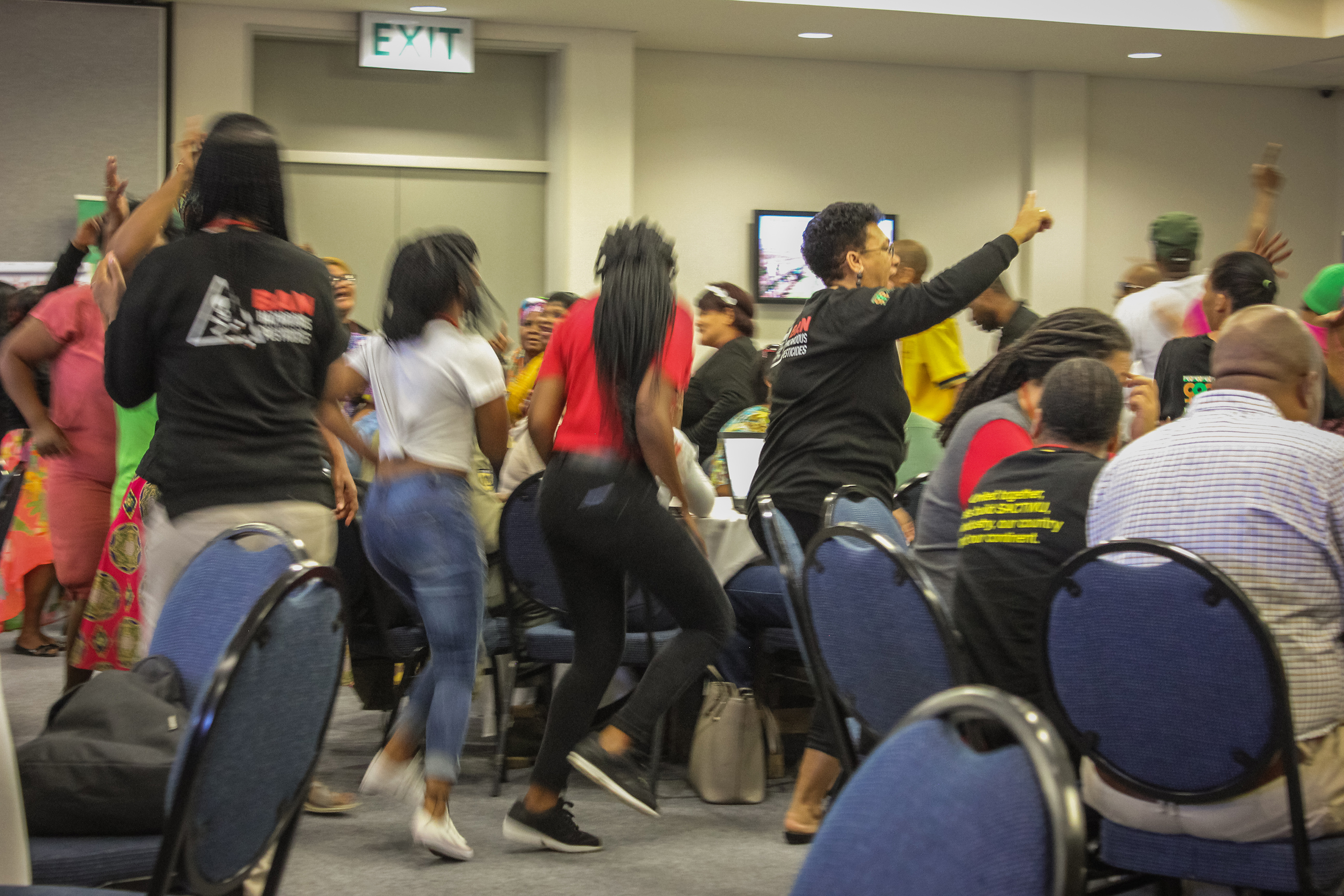
Lenie Coetzee (centre right) joins other farmworkers as they open the Future of Farm Workers conference with dance and song. Photo: Christi Nortier
This non-governmental organisation focuses on educating women farmworkers about their labour, land, health and food security rights as well as supporting them in claiming and realising these rights.
The project aids its members by training them to establish a garden in an “agroecological way”. They provide them with seeds and then train them to harvest them again later themselves.
After receiving this training, both Paulse and Du Plessis soon became so successful that they could provide vegetables for their family and their neighbours.
They would expand their garden’s boundaries by pulling out trees and removing rocks. They decided to sell the rest in town and give to those who couldn’t afford to buy.
They both took the money they made from selling their vegetables and re-invested.
Paulse opened a tuckshop and allowed customers to buy on credit if they didn’t have enough money that day for food. The money she made at the tuckshop she used to buy herself a goat.
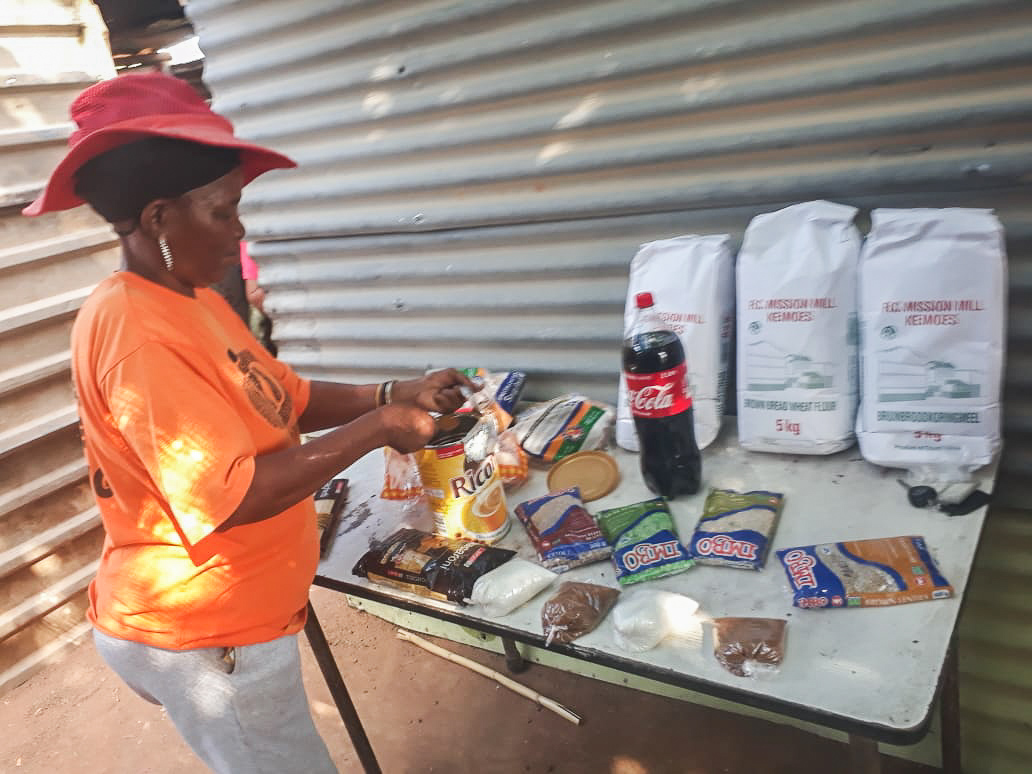
Sanna Paulse’s tuckshop was started with the money she made from her vegetable garden, which in turn allowed her to buy her first goat. Photo: Lenie Coetzee
“Now I have 19 goats that belong to me. It is my business,” she says to a room bursting with applause during her conference presentation. She continues to grow spinach, onions, carrots, tomatoes and beetroot.
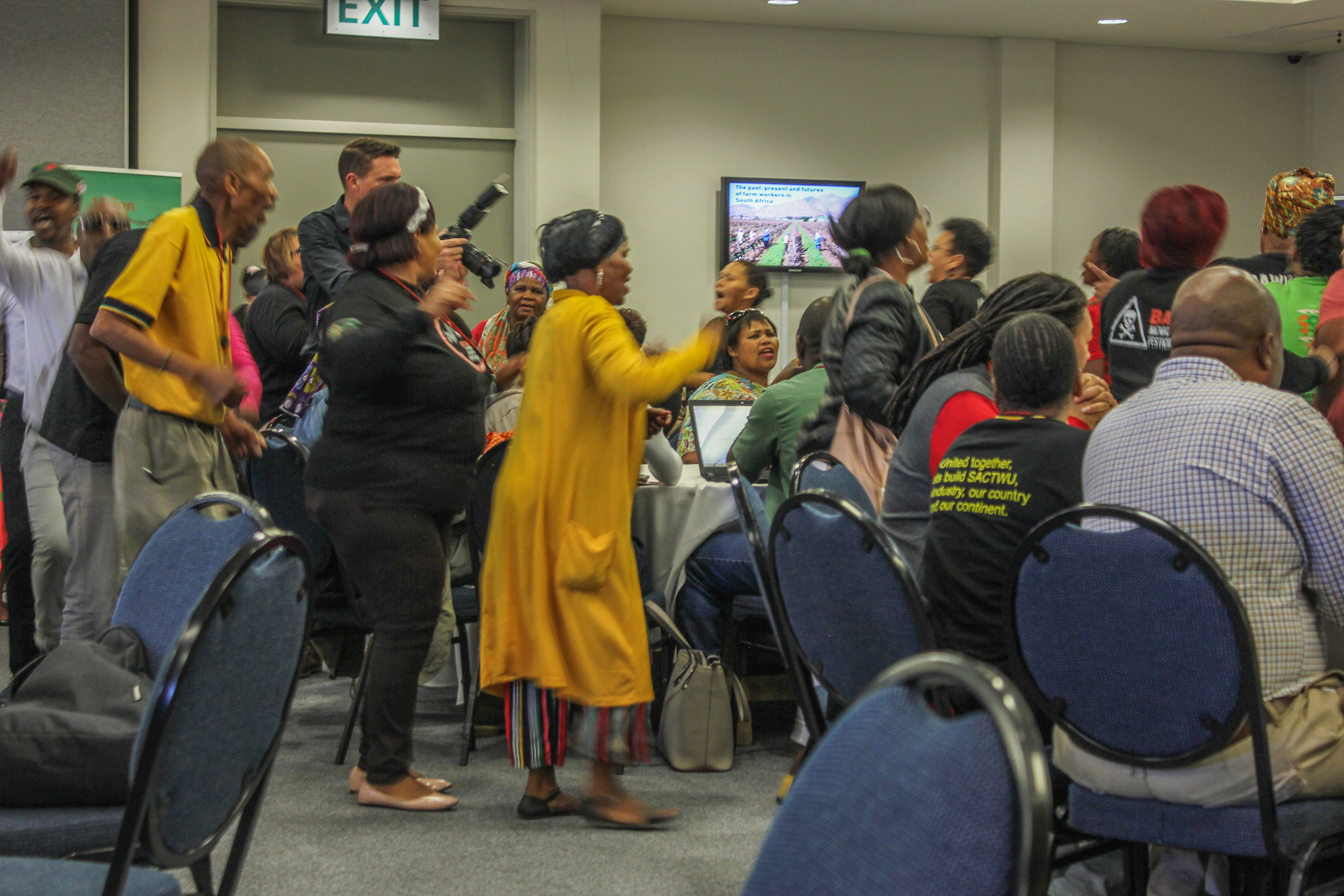
Sanna Paulse (centre, yellow coat) joins other farmworkers as they open the Future of Farm Workers conference with dance and song. Photo: Christi Nortier
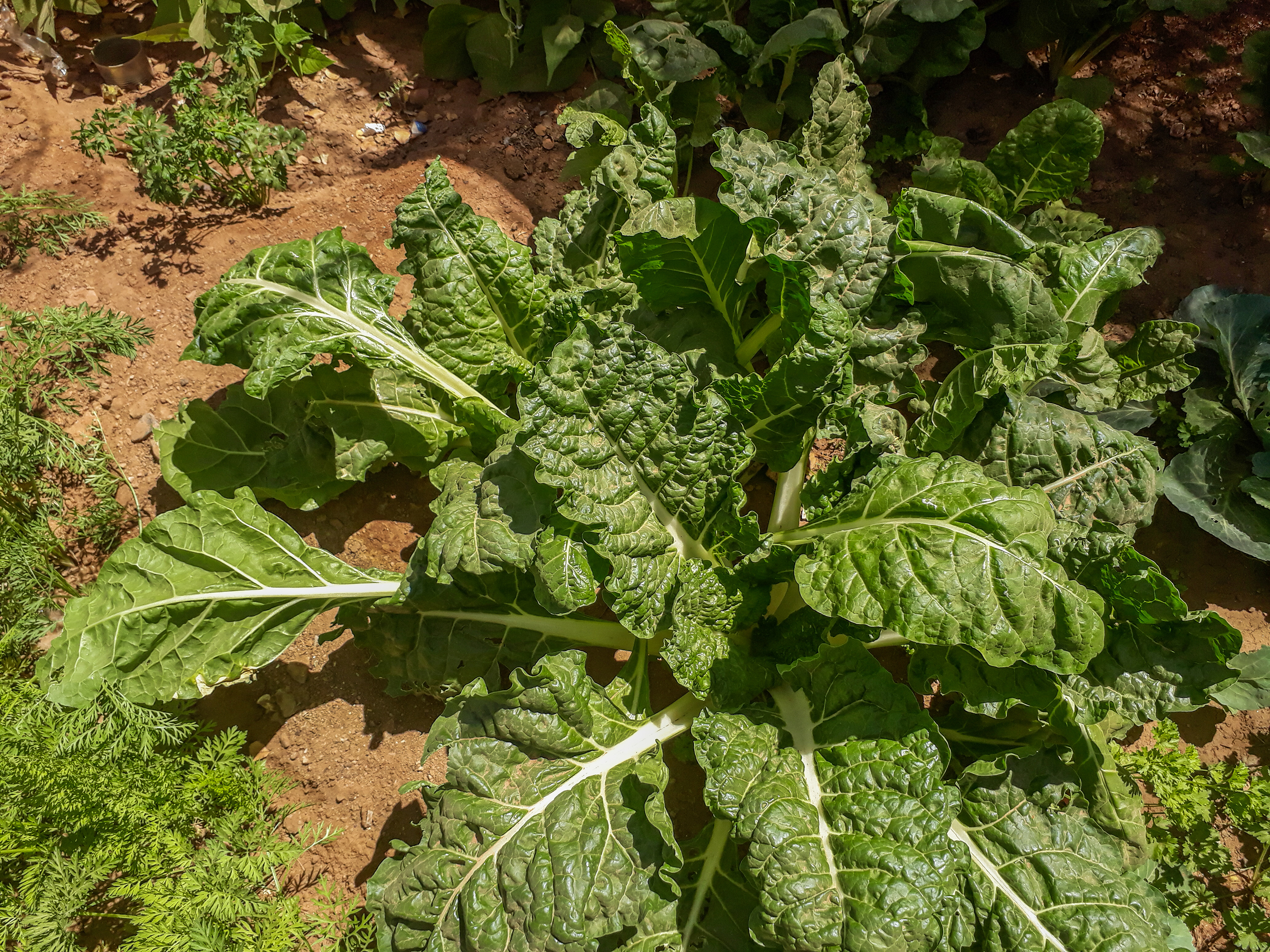
The spinach grown in Sanna Paulse’s garden is either eaten by her family and neighbours, sold in town or given to her goats. Photo: Lenie Coetzee
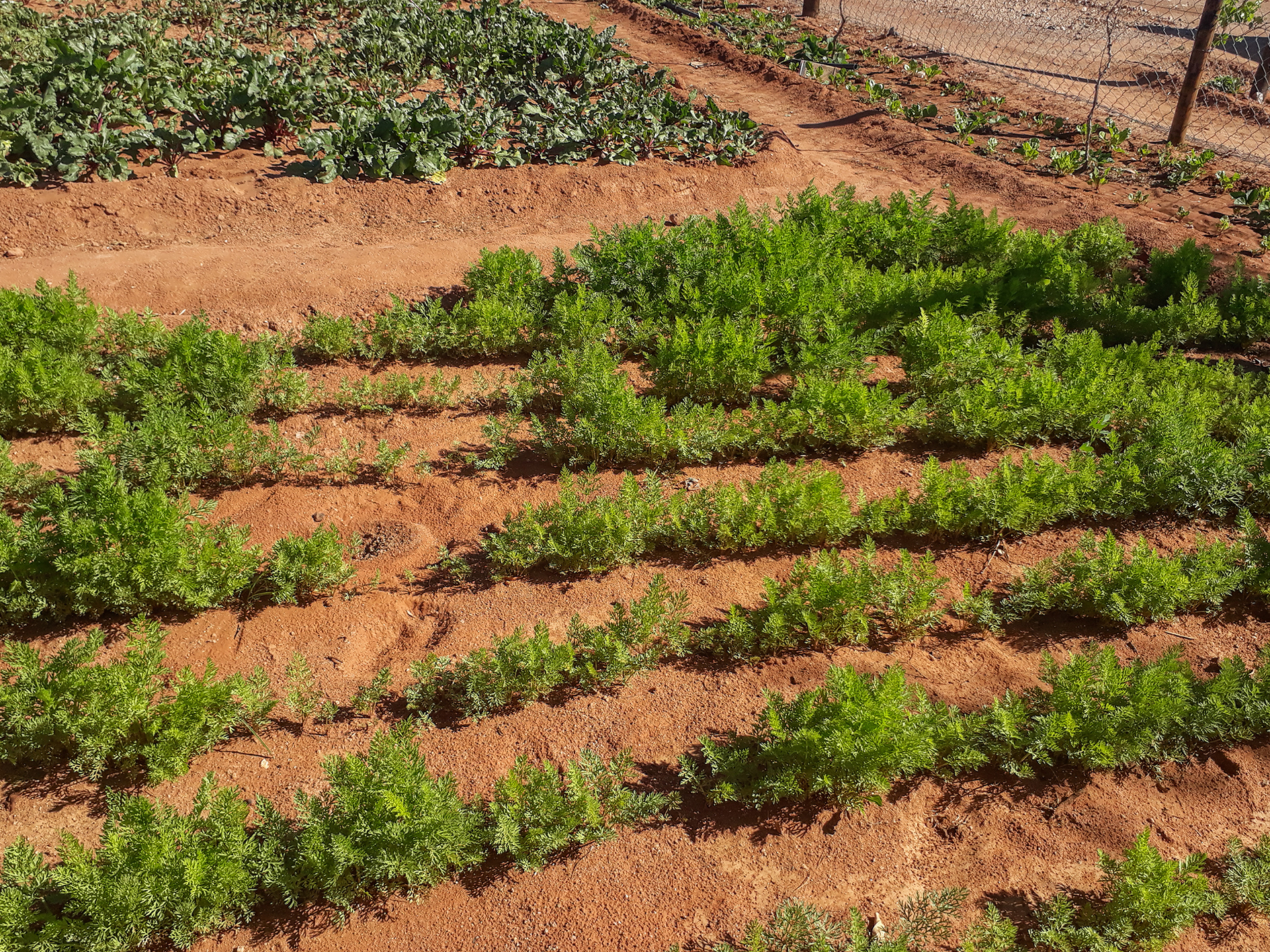
Carrot tops peep put of the dry, sandy soil in Sanna Paulse’s vegetable garden. Photo: Lenie Coetzee
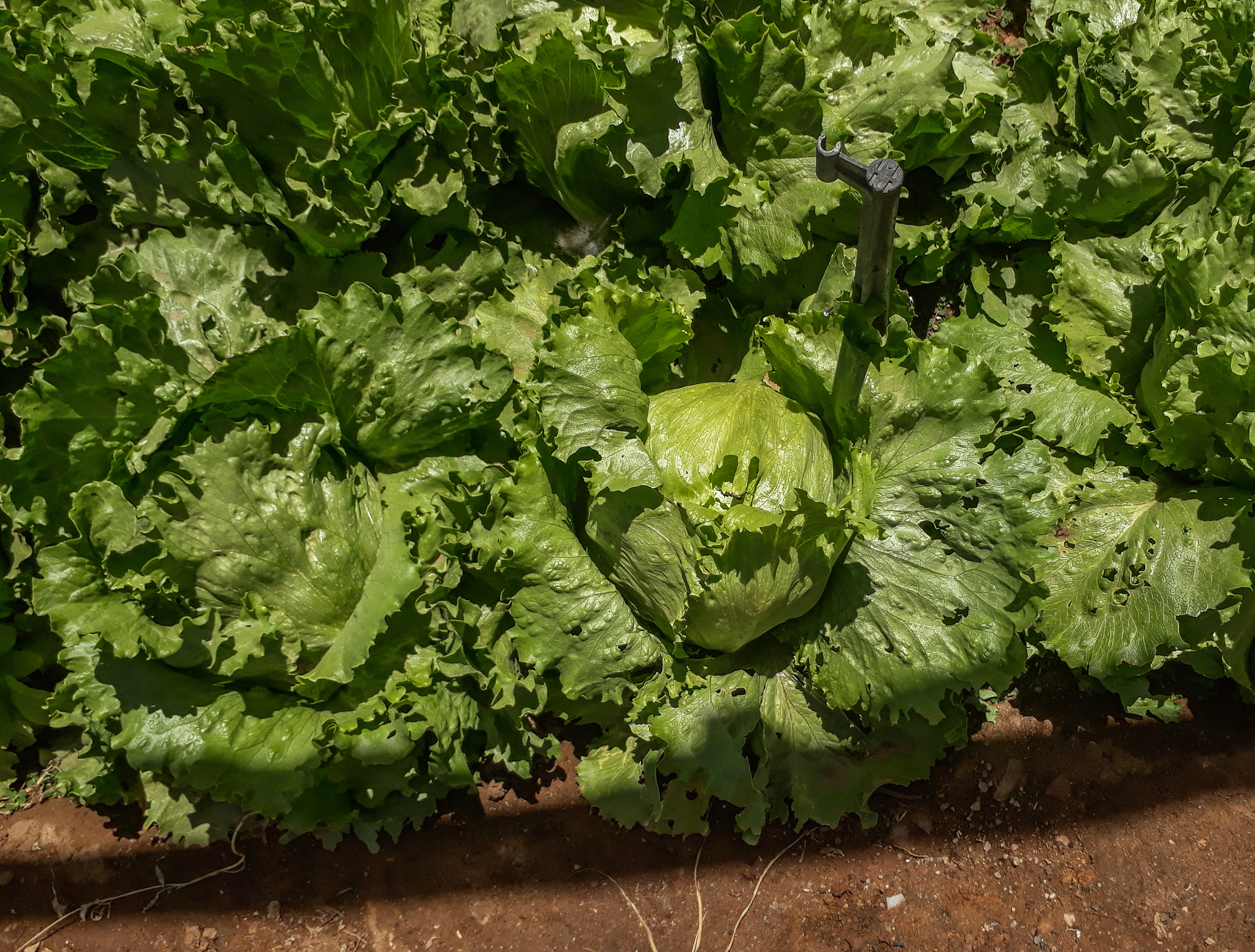
Lettuce is lush in Sanna Paulse’s vegetable garden. Photo: Lenie Coetzee
Du Plessis took the vegetable money and bought a laptop for her budding registered small-farmer co-operative. She set up a second vegetable tunnel and, over time, bought goats, chickens, pigs and ducks. She grows watermelon, peaches, pumpkins, potatoes, peppers, spinach, beetroot, tomatoes, carrots and onions.
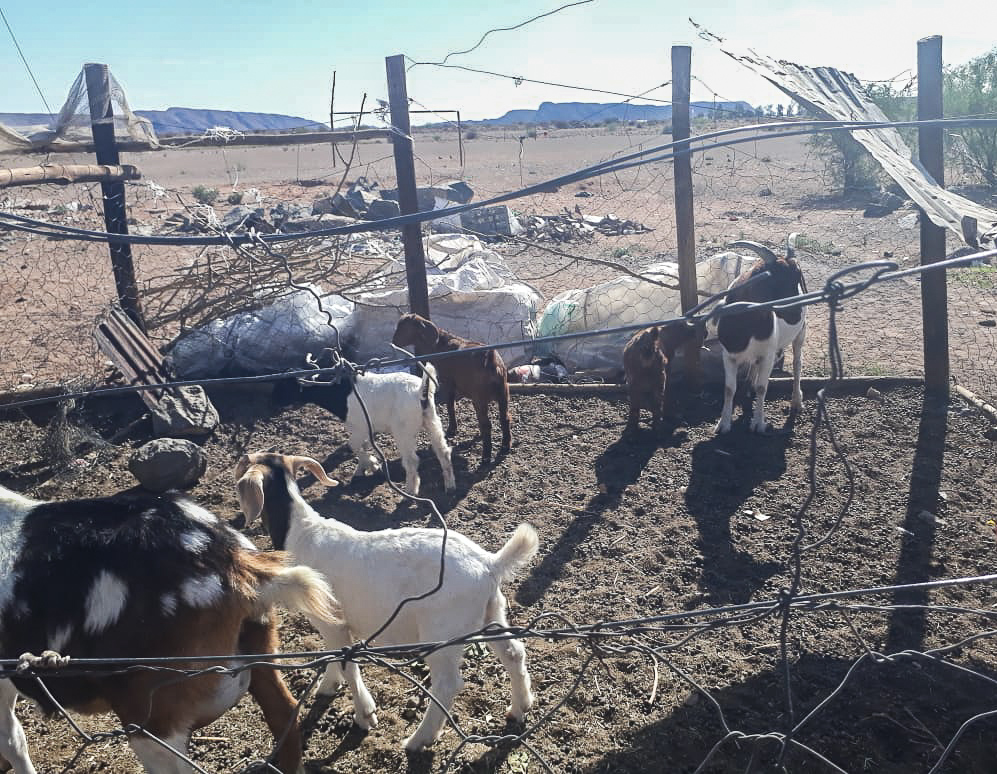
Sanna Paulse’s goat herd has just welcomed six kids, bringing the total of her herd to 19. Photo: Lenie Coetzee
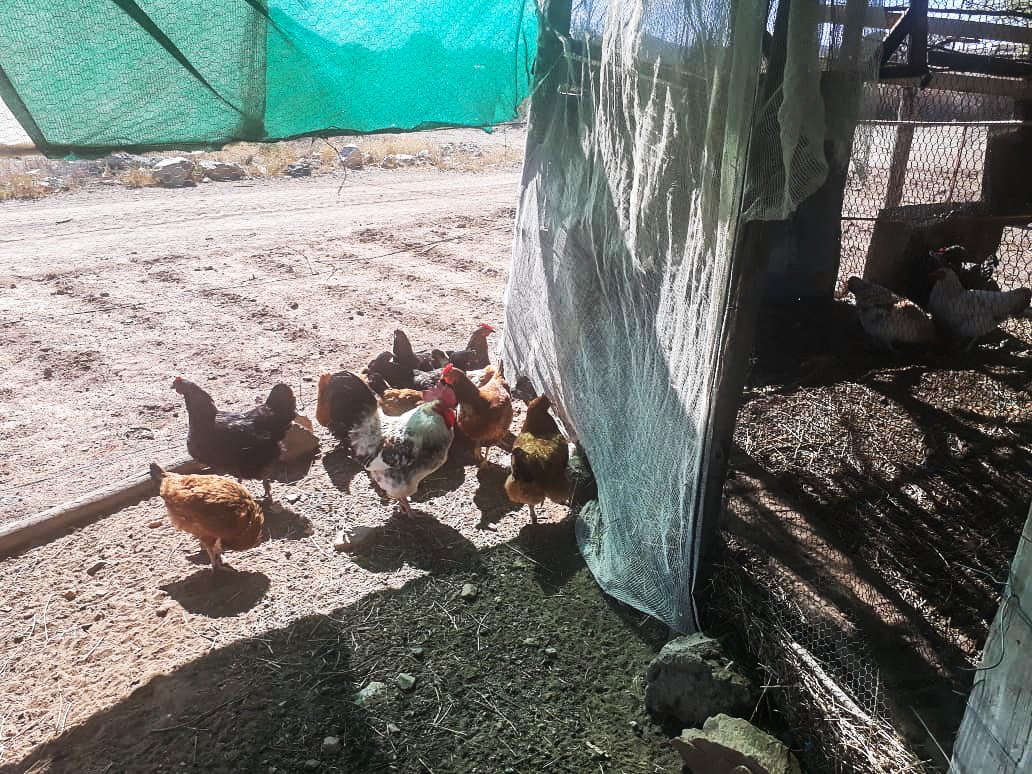
Nonceba du Plessis has 30 chickens. Their eggs pay for her children’s education. Photo: Lenie Coetzee
The money she makes from selling eggs pays for her children’s education. She has done a course in business management and has started a brick-making project. In two weeks she starts construction on her own home.
She is no longer a seasonal worker: “I am my own boss now because of the Women on Farms Project. Really, I don’t want to lie. I am my own boss now.”
Both women express a strong sense that their garden is not just for them and their family, but for anyone who cannot afford food.
“I help the community – for those who have nothing, I give them something to eat and I make a soup from the garden and tunnel,’ says Du Plessis. “I take the soup from my place out to the town where there are street kids. Each Sunday I make this soup, so I can also preach the gospel of God to those who have nothing.”
Before the gardens, Coetzee found that women could only afford to eat vegetables on Sundays. “Now, you’ll see the children playing soccer and then they run into the garden, pick a tomato or carrot, run it under the tap and eat it. What we also see is that health, in general, has improved,” says Coetzee.
But, they feel they cannot continue alone as their limited resources will only take them so far.
“What I would like the most, and what I want to say to the government and those who are in charge, is that they must take the Women on Farms Project seriously. Because we work hard to provide for our children and our community,” says Du Plessis.
“What we do we are not doing for ourselves only. We are doing it for the community and those who have nothing because we are coming from the rural area where there is no work. There’s nothing. So, they depend on our gardens… I am the hope in my village.
“The government knows about my tunnel. Yes, yes, they know. They promised to give us implements to expand our land that we have. We didn’t receive them.
“The money I receive is hand-to-mouth because I have to hire the things that move those big stones. So when we hire them, its R6,000 for 10 days and then they don’t do the whole work. I still have to do more with my own hands.
“I know where I am standing. I have a vision and I see from here to there. Next year I will have more livestock because I know I work hard. I work hard. I have no time to waste. I work hard because I want my children to be in university. I didn’t have that chance to go to university, so it is my dream to see my children go out of the village and to the university so that they can don’t only have to go to the vineyard or work for the white people. I am a self boss.”
At the moment, Du Plessis uses a wheelbarrow to transport her produce down a 3km gravel road to the main road where she pays for a taxi to town. This hot journey damages her crops and increases her expenses.
Paulse agrees that they need more land and better transport to expand their businesses and provide for those in need around them. “What I would like is for the government to give me more land. It doesn’t have to be big, but just some land so that I can plant more vegetables and take my business forward and buy a lorry for myself. That’s what I want. I want to make a future for my children.”
Coetzee shares the same sentiment. “I hope that with all those vegetable gardens together, the government will come and see what the women did. I hope that at the end of the day they will give the women more land to grow more vegetables, give them a cold storeroom and help them to negotiate with the big shops.
“That is our dream at the end of the day – that Sanna not only gives to her community and herself, but that she can take her vegetables to a shop and sell it there. We want to process the vegetables so that we add even more value. That is my dream. That is my big dream.”
Their tenacity and success resonated with other women farm workers at the conference. “There are two ladies here from the Northern Cape from Warmsand. I saw how they are planting. I was so proud of them because there are few women who really get up and go to a garden and do something.
“Their sand is so dry, and the soil is so fluffy. You can see they are battling on that soil, but they put something on the table at the end of the day for their children and for the community. It mustn’t end there. You must also encourage others to plant,” said small-scale farmer Elsie Sauls from Ashton in her address to the conference as a representative of the Trust for Community Outreach and Education.
And encourage they do. “In any place, in any way, you can have your own garden. Even in your kitchen you can have your own garden,” says Du Plessis.
Paulse adds: “Everyone can eat their own food out of their own garden. Even when you don’t have money for vegetables from the shop, you will be able to get many different vegetables from your garden.”
“When you don’t have enough land, then you get some buckets and you put in beetroots, onions, carrots and herbs. Then you have a variety of different vegetables without land,’ says Coetzee. “Another challenge is water, so we have learnt to use greywater from washing clothes and so on. For me, there is no excuse: start your own vegetable garden.”
Images of their healthy, vibrant produce were projected onto the screen behind them throughout their presentation. Every new image drew gasps of astonishment from audience members. Later, they joined other women farmworkers as they danced and sang: “Ons vrouens, ons is gevaarlik. Ons vrouens, ons is gevaarlik…” DM




